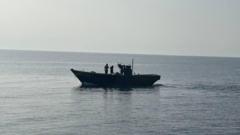South Korea has facilitated the repatriation of six North Koreans who inadvertently strayed into its waters. The South Korean Ministry of Unification reported that all six had repeatedly voiced their intention to return to North Korea. This group includes two individuals who deviated into southern waters back in March, spending a record four months in South Korea, and four sailors who drifted into southern waters in May. This marks the first repatriation under the administration of President Lee Jae-myung, who favors improved relations with North Korea.
For some time, South Korea and North Korea attempted to arrange the return but were hindered by a lack of communication, especially after Pyongyang severed contact lines in April 2023 amidst escalating tensions. The North's leader Kim Jong Un recently proclaimed that unification is no longer a feasible prospect, casting doubt on any potential dialogue.
Historically, when North Koreans have accidentally navigated into the South, both nations coordinated returns via land borders. However, the remaining avenues for contact now seem to be limited to the US-led United Nations Command and media sources, reflecting the deeply strained relationship.
The unpublicized repatriation was marked by the presence of North Korean patrol vessels at the handover point, suggesting some clandestine agreement may have occurred behind closed doors. Experts like Nam Sung-wook from the Korea National Strategy Institute anticipate extensive interrogations for the six returnees, focusing on whether they possess any sensitive information.
Once settled back, they may be instructed to assist in efforts to propagate the regime's messaging, reinforcing its legitimacy amidst external pressures. Michael Madden, of the Stimson Center, explained the context of the incident, hinting at the political complexities involving both Korean governments, especially during periods of provisional leadership in the South.
Reactions among North Korean defectors remain mixed, with some advocates expressing frustration over their missed chance to educate the returning individuals about life in South Korea. Activist Lee Min-bok lamented the lack of opportunity for engagement with the repatriates, underscoring concerns regarding their potential treatment upon return.
President Lee's administration has shown a willingness to mend ties with Pyongyang, suspending propaganda broadcasts to emphasize peace. However, analysts caution that prospects for significant improvements in relations are dim, given growing North Korea's alignment with Russia and lack of domestic interest in engaging with the North.
As tensions remain high, and communication lines effectively severed, the future of inter-Korean relations appears uncertain, leaving many to question the efficacy of ongoing diplomatic efforts.




















